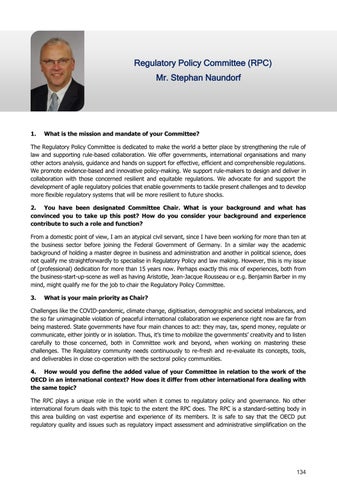Regulatory Policy Committee (RPC) Mr. Stephan Naundorf
1.
What is the mission and mandate of your Committee?
The Regulatory Policy Committee is dedicated to make the world a better place by strengthening the rule of law and supporting rule-based collaboration. We offer governments, international organisations and many other actors analysis, guidance and hands on support for effective, efficient and comprehensible regulations. We promote evidence-based and innovative policy-making. We support rule-makers to design and deliver in collaboration with those concerned resilient and equitable regulations. We advocate for and support the development of agile regulatory policies that enable governments to tackle present challenges and to develop more flexible regulatory systems that will be more resilient to future shocks. 2. You have been designated Committee Chair. What is your background and what has convinced you to take up this post? How do you consider your background and experience contribute to such a role and function? From a domestic point of view, I am an atypical civil servant, since I have been working for more than ten at the business sector before joining the Federal Government of Germany. In a similar way the academic background of holding a master degree in business and administration and another in political science, does not qualify me straightforwardly to specialise in Regulatory Policy and law making. However, this is my issue of (professional) dedication for more than 15 years now. Perhaps exactly this mix of experiences, both from the business-start-up-scene as well as having Aristotle, Jean-Jacque Rousseau or e.g. Benjamin Barber in my mind, might qualify me for the job to chair the Regulatory Policy Committee. 3.
What is your main priority as Chair?
Challenges like the COVID-pandemic, climate change, digitisation, demographic and societal imbalances, and the so far unimaginable violation of peaceful international collaboration we experience right now are far from being mastered. State governments have four main chances to act: they may, tax, spend money, regulate or communicate, either jointly or in isolation. Thus, it’s time to mobilize the governments’ creativity and to listen carefully to those concerned, both in Committee work and beyond, when working on mastering these challenges. The Regulatory community needs continuously to re-fresh and re-evaluate its concepts, tools, and deliverables in close co-operation with the sectoral policy communities. 4. How would you define the added value of your Committee in relation to the work of the OECD in an international context? How does it differ from other international fora dealing with the same topic? The RPC plays a unique role in the world when it comes to regulatory policy and governance. No other international forum deals with this topic to the extent the RPC does. The RPC is a standard-setting body in this area building on vast expertise and experience of its members. It is safe to say that the OECD put regulatory quality and issues such as regulatory impact assessment and administrative simplification on the
134
















